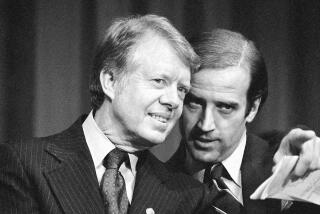Warren Christopher, a Man of Trust : Cabinet: His experience and judgment at home and abroad will make him an excellent secretary of state.
- Share via
From 1978 to 1981, as undersecretary of state for political affairs, it was my privilege to work down the hall from then Deputy Secretary of State Warren Christopher. I can only applaud President-elect Clinton’s naming him secretary of state.
The most successful secretaries of state have been those who have had the full confidence of the President. In the pressured world of foreign policy, a secretary must feel confident of his access to the White House and his authority to speak for the Administration without challenge. Every indication suggests that Christopher and the President-elect have established that kind of relationship.
The secretary of state is, or should be, the principal diplomatic negotiator, in Washington or abroad. Christopher demonstrated his readiness for that task during his years in the Carter Administration. He was assigned some of the toughest issues on the agenda. He piloted the Panama Canal Treaty through a reluctant Senate in 1978. Within the State Department, he mediated among bureaucratic elements with markedly different views on human rights policy. He was dispatched to Europe in 1978 to meet with and calm an angry German Chancellor Helmut Schmidt after President Carter unexpectedly reversed the decision to produce the neutron bomb. As the climax to his service, he spent grueling days in Algiers conducting negotiations with Iran to obtain the release of the embassy hostages.
In talking with those who have participated in these negotiations with Christopher, several words recur: “absolute discretion,” “trust” and “principled.” One colleague commented to me, “Warren is the best negotiator I have ever seen. He prepares well, he understands and appreciates the arguments on the other side and he knows when to compromise and when, on principle, to stick to his guns.” During his time in the State Department, he won the respect of those with whom he frequently negotiated in the Congress as well as of world leaders, groundwork that will help him in his new task.
A secretary has other responsibilities as well. He is the principal adviser to the President on foreign policy and, depending on the President’s wishes, the principal foreign policy spokesperson for the Administration to Congress and to the public.
As deputy secretary, Christopher was primarily an implementer of policy and a trouble-shooter. Major policy projections and decisions in the Carter Administration lay with the president, Secretary of State Cyrus Vance and National Security Adviser Zbigniew Brzezinski. For Christopher, this aspect of the position would be a new test of his experience and demonstrated judgment and capacity.
Christopher makes no claim to flamboyance as a speaker, but he has the ability, demonstrated not only in diplomacy but also in his several other contributions to public life, such as the commission on the Los Angeles police, to present a clear and persuasive analysis of difficult and significant issues. In today’s world of an active media and strong public participation, the capacity to explain and the garnering of public trust are important. Christopher would bring both to his articulation and support for Clinton’s policies.
The Carter Administration faced a host of challenges in foreign policy, including the Soviet invasion of Afghanistan, the revolution in Iran, preservation of the alliance in Europe and the quest for peace in the Middle East. The new Administration will face equally complex challenges in each of the continents. In Christopher, the President-elect has someone with broad trust at home and abroad and the judgment and experience to serve American interests well. He has been there.
More to Read
Get the L.A. Times Politics newsletter
Deeply reported insights into legislation, politics and policy from Sacramento, Washington and beyond. In your inbox twice per week.
You may occasionally receive promotional content from the Los Angeles Times.










